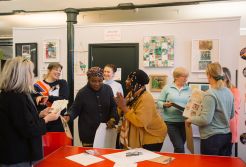18 April 2008
'Impersonal' education criticised
ESRI research goes national
GOVERNMENT initiatives have reduced children to the status of "targets and outputs" in a school system ruled by political "whim", researchers have suggested.
Centralised control over primary education has increased significantly in the past 15 years as ministers introduced new targets, more testing and league tables of schools based on results.
Research conducted as part of the biggest inquiry into primary education in England for 40 years warned that the focus on results and initiatives had created an "impersonal" system.
The study was conducted by Dr Liz Jones, Dr Andy Pickard and Professor Ian Stronach at MMU’s Education and Social Research Institute as part of the Cambridge-based Primary Review.
Micro-management
Their report said many older teachers felt they had lost the freedom to run their own lessons in the face of government "micro-management of their work".
It "remains to be seen" whether the Government's drive for more "personalised" education will bring about a "more liberal" concept of schooling, the study said.
"The system appears to have been damaged over the last 15 years or so by excessive policy intervention, and by frequent successions of initiatives, task forces and projects of various kinds," the study said.
"The preference for short-term initiatives of sometimes conflicting ambitions rather than long-term development is regrettable, although there are some indications that research-based criticisms of this 'churning' culture are now being taken more seriously."
Consultation with schools
The academics called for a "slower" and more carefully-considered way of developing education policies, involving more discussion with schools.
Dr Jones said: "Teachers have had to deal with a huge amount of initiatives. How people have dealt with that varies but there's a significant thread of people clinging on to their own sense of identity and professionalism.
"There has been insufficient time to reflect, consolidate and to critique. Just as teachers get used to something another policy comes along."
Teachers were beginning to get back some of the autonomy they felt they had lost, she said. But younger teachers often welcomed the support and guidance provided by the initiatives.
For more about MMU research into education and schooling, go to www.mmu.ac.uk/esri


